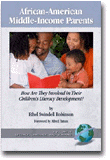
African-American Middle-Income Parents
How Are They Involved in Their Children's Literacy Development?
By:
Ethel Swindell Robinson, Swindell Associates
A volume in the series: Literacy, Language and Learning. Editor(s): Claudia Finkbeiner, Universitaet Kassel. Wen Ma, Le Moyne College.
Published 2007
"Ethel Robinson has written an amazing book. As she wisely argues, despite a rapidly growing middle and upper class, popular media and public debates continue to view African-American families from a deficit perspective. Portrayals of African-American families in newspapers, television, and contemporary scholarship tend to focus on single-parent households, low parental expectations, and lack of family involvement in schooling. The families you will meet in this book contradict these stereotypes. In carefully crafted vignettes, Dr. Robinson paints an alternative portrait of life in African-American households. In this marvelous book, you will see eight intact families intimately involved in the academic and social lives of their children. Some volunteer in their children’s classrooms; others serve as devoted tutors and mentors; still others are active advocates, arguing passionately for school services; all hold fast to the hope that their children will achieve their piece of the American dream. This book is a powerful antidote to the negative portrayals of African-American families that abound in mainstream media. It is a 'must-read' for researchers, educators, and all who wish to look beyond and beneath the stereotypes of African-American family life." ~ Susan Hynds, Ph.D., Professor of English Education, Syracuse University Reading and Language Arts Center
CONTENTS
Foreword, Alfred W. Tatum. Acknowledgments. Introduction: Middle-Income Images and Perceptions. Child’s Literacy Learning: Like a Brick Wall Keeping Her on Task. Creating Positive Involvement Roles: Embracing Advocacy. Religion: The Umbrella for Parental Perceptions of Involvement. Involvement Roles: Not Fifty–Fifty. Involvement and Socialization Practices for Self-Sufficiency. Perceptions of Involvement and Micromanaging a Child’s Education. A Parental Literacy Dilemma. Uncovering the Key Meaning of Parental Involvement. Conclusion. References. About the Author.
-
Paperback978-1-59311-829-7
Web price: $45.04 (Reg. 52.99)
-
Hardcover978-1-59311-830-3
Web price: $80.74 (Reg. 94.99)
- eBook9781607527466

- EDU038000 - EDUCATION: Student Life & Student Affairs
- EDU015000 - EDUCATION: Higher
- EDU037000 - EDUCATION: Research
-
 Authentic Voices
Culturally Responsive Teaching and Learning
Authentic Voices
Culturally Responsive Teaching and Learning
-
 Collaborative Learning in a Global World
Collaborative Learning in a Global World
-
 Educational Practices in China, Korea, and the United States
Reflections from a Study Abroad Experience
Educational Practices in China, Korea, and the United States
Reflections from a Study Abroad Experience
-
 Innovative Approaches to Teaching Multilingual Students
Innovative Approaches to Teaching Multilingual Students
-
 Listening to the Voices of Boys
Exploring the Motivation of Primary Boys to Engage in Reading
Listening to the Voices of Boys
Exploring the Motivation of Primary Boys to Engage in Reading
-
 Reconceptualizing Literacy in the New Age of Multiculturalism and Pluralism
2nd Edition
Reconceptualizing Literacy in the New Age of Multiculturalism and Pluralism
2nd Edition
-
 Views from Inside
Languages, Cultures, and Schooling for K‐12 Educators
Views from Inside
Languages, Cultures, and Schooling for K‐12 Educators

